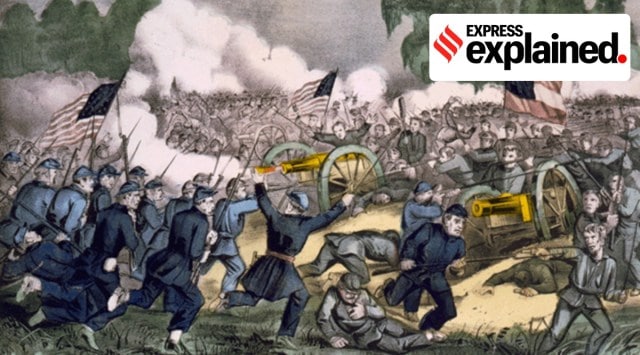This Quote Means: ‘Those who deny freedom to others, deserve it not for themselves’
As the US observes the anniversary of the Civil War’s end, we explain a quote from Abraham Lincoln. Quotes by famous historical figures form an important part of the syllabus for the UPSC CSE Essay paper.
 The battle of Gettysburg by Nathaniel Currier and James Merritt Ives. The American Civil War ended on this day in 1865. (Photo: Wikimedia Commons)
The battle of Gettysburg by Nathaniel Currier and James Merritt Ives. The American Civil War ended on this day in 1865. (Photo: Wikimedia Commons)The Army of Northern Virginia surrendered 158 years ago on April 9, 1865, at Appomattox Court House, Virginia. The American Civil War was all but over. Minor clashes continued through to May, but the fate of the war was sealed.
The Union Army had won and the Confederate Army was defeated after four years of bloody fighting which had consumed the lives of at least 620,000 men, not including President Abraham Lincoln, who was shot dead by a Confederate sympathiser John Wilkes Booth on April 14, 1865.
While debates rage on about the complex causes of the Civil War, simply put, the Civil War was born out of a basic disagreement among Northern and Southern states about the institution of chattel slavery. While the more industrialised North was against the spread of slavery into newly captured territories in the American West, the South, dependent on slave labour to run its plantations, was for it. Eventually the Southern states seceded from the Union to preserve the right to practise slavery, sparking off the Civil War.
Today’s quote gives the moral argument made by opponents of slavery. This quote is taken from a letter Abraham Lincoln, US President and commander-in-chief of the Northern states, wrote in 1859, when tensions between Northern and Southern states were on the rise, two years before the War started.
The quote
“Those who deny freedom to others, deserve it not for themselves; and, under a just God, can not long retain it,” Lincoln wrote, expressing his personal opinion on the institution of slavery. At the time, his political position was not nearly as hardline as it would become – he was only interested in containing slavery rather than abolishing it, with his priority being to save the Union.
However, personally, he found the institution morally reprehensible and expressed his ethical argument in this letter. He argues that not only is denying people freedom fundamentally unsustainable “under a just God”, but those who perpetuate it deserve to have their own freedoms denied.
An age old argument “for being good”
Ethics based on empathy is not a uniquely Lincolnite idea. “Treat others as you want to be treated yourself” is an age-old axiom. This is because at a very basic level, human beings experience the world the same way: everyone yearns to live a life of freedom, to be who they are, to feel happy. Thus, when interacting with one another, empathy is necessary – so as to not treat someone in a way one would not want to be treated oneself.
Lincoln expresses this idea in the context of slavery. To practise and perpetuate slavery, slavers had to effectively dehumanise the slaves – treat them as subhuman, not deserving the same treatment as you. This was done using the ideology of white supremacy and racism. But from the slaves’ perspective, their experiences and trauma were very much ‘human’ – subject a slaver through the same ordeal and they would feel similarly.
This is what Lincoln means when he says that “those who deny freedom to others, deserve it not for themselves”. Only when subjected to the same treatment would they be able to truly understand the depravity of their actions.
Popper’s paradox and the justification to fight injustice
In the 1940s, the philosopher Karl Popper came up with what he called “The Paradox of Tolerance.” It goes like this: If everyone is tolerant of every idea, then intolerant ideas will emerge. Tolerant people will tolerate this intolerance, and the intolerant people will not tolerate the tolerant people. Eventually, this will lead to intolerant people amassing power and eventually creating a culture and society of intolerance.
Obviously Lincoln predates Popper and both are speaking in very different contexts. However, in some ways, Lincoln and Popper suggest similar things. Popper says that one cannot be tolerant of intolerance. For Lincoln, “one cannot have the freedom to deny others their freedom”. If one allows this, eventually, instead of a society which cherishes individual freedom, the very concept of freedom would be warped to benefit only the powerful.
This is crucial as much of the framing of the conflict in Southern states is around the issue of “state rights” and “federal overreach”. They argued (and many Southerners still argue) that states should have the right to decide their fate as they wish to, even if that means the right to enslave, dehumanise, and inflict untold suffering onto millions of fellow human beings.
Lincoln’s rejection of this idea becomes the eventual justification for the War.
The unsustainability of injustice
The second part of Lincoln’s quote indicates the inherent unsustainability of injustice. He says that “they can not long retain it”, suggesting that those who oppress others or deny them their rightful freedoms will eventually face consequences.
The kind of consequences Lincoln refers to stem from his belief in a “just God”. Lincoln believes that the denial of freedom goes against the natural order of justice and equality, as God made it. Thus those who deny freedom will ultimately face consequences of this from God, while living or after death.
This argument can also be made from a non-believer’s perspective. Afterall, history is testament to the fact that people have always risen up against injustice. Even seemingly infallible regimes and undefeatable autocrats have eventually been toppled. At the height of the trans-Atlantic slave trade, Companies had been granted royal charters to last a 1,000 years. Many did not last even a hundred.



- 01
- 02
- 03
- 04
- 05



































